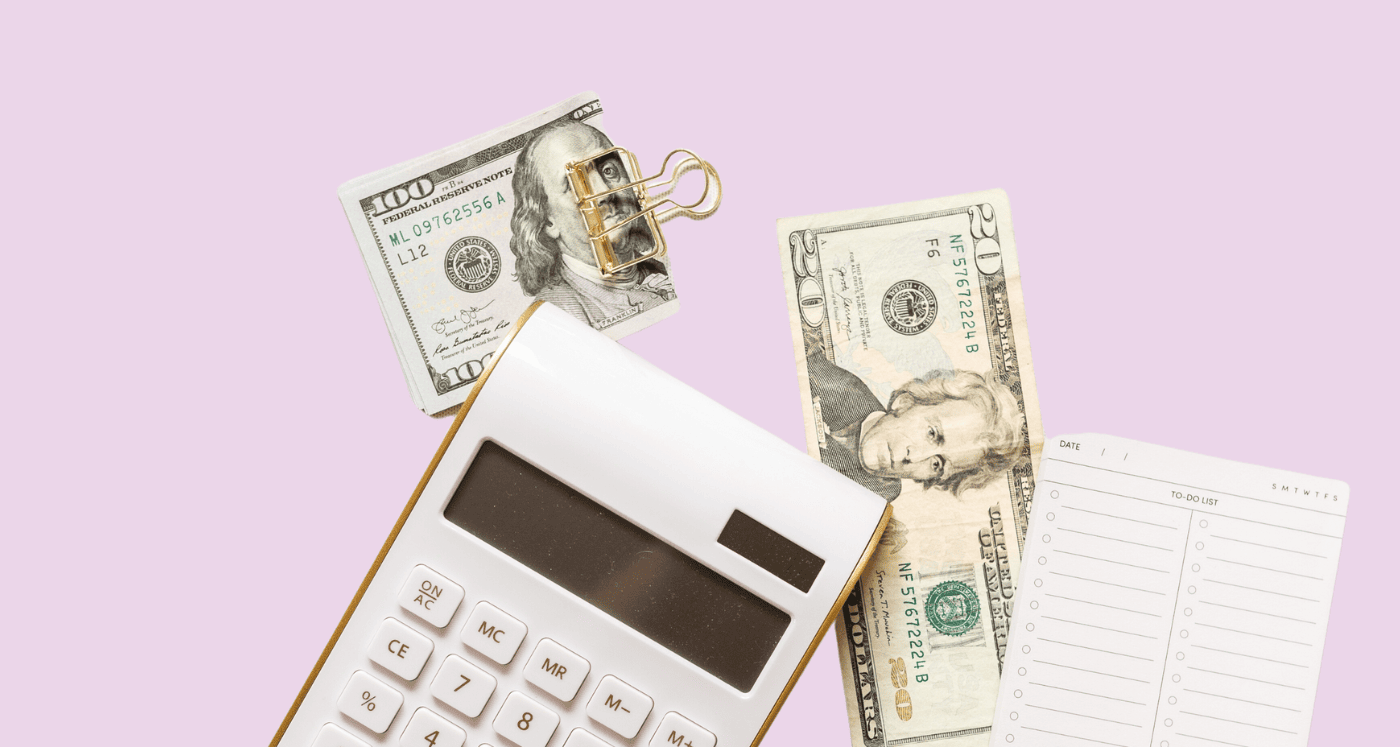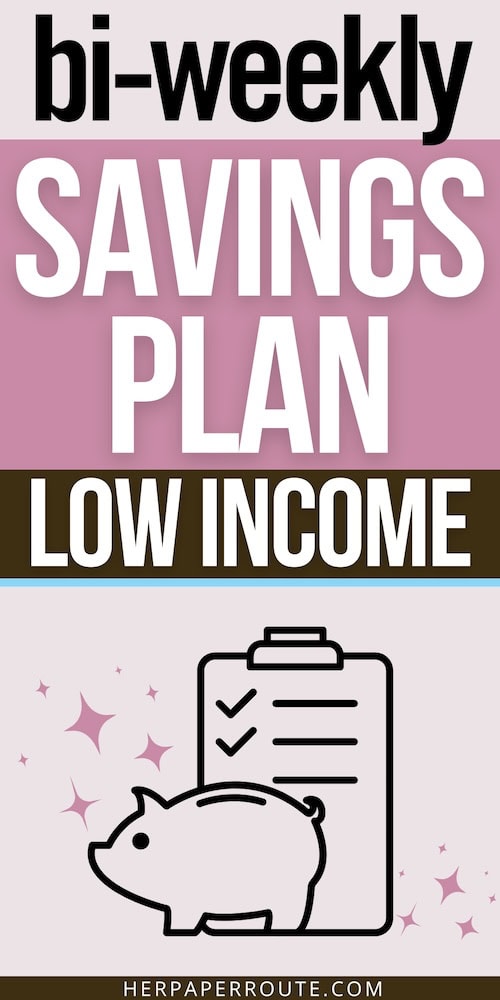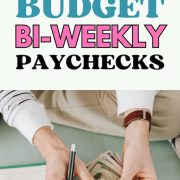How To Budget Bi-Weekly Paychecks

Are you curious about how to budget bi-weekly paychecks? I’ve been there, and I created a seamless process for making it work. Which I will share with you in this guide.
I’ve worked for every kind of payment schedule out there. I’ve been paid weekly, biweekly, monthly, and even on an inconsistent basis. None have been as hard to manage as biweekly out of all the different paychecks I’ve gotten.
As an affiliate partner of various brands and sponsored content, HerPaperRoute may earn commission on qualifying purchases. Disclaimer
You would think it would be harder to plan monthly income, but that isn’t the case. At least, it wasn’t for me. When I was getting paid once every month, I made sure that I set aside the money to pay all of my bills that month in one fell swoop.
Comparatively, being paid weekly was great because I always had access to a reservoir of cash, and if I didn’t, it wasn’t too long before I could get paid again. Read on to learn how I made budgeting bi-weekly paychecks a snap!
Learning How To Budget Bi-Weekly Paychecks

Biweekly payments sit awkwardly in between the two. You don’t get enough pay to ensure all your bills are covered, but you’ve also got to wait another two weeks to get more money.
This can lead to credit card usage, which is something I always avoid.
It was weird that despite my sending habits, bill payments, and pay rate not changing; I constantly had less money when I was on a biweekly paycheck.
Below, I’ll share what I learned about how to manage biweekly paychecks in the hopes that you don’t suffer for as long as I did.
A Note About Budgeting
Before we start, you should keep in mind that budgeting is a very individual thing. Your current goal may be to save for a vacation or you could be trying to catch up on bills.
If any of my systems don’t seem right for you, don’t fret. Not only are there plenty more budgeting methods out there, but you can even modify my systems if you need to.
Personal finance is just that, personal, so don’t be afraid to innovate. No budgeting system is wrong if it helps you manage your expenses, bills, and pay.
Thus, as long as you review your budget twice a year, each bill is going to be met and payment covered.
Managing Your Biweekly Pay
Getting paid every second week instead of getting paid once a month means you’re going to have to do some micromanaging. This is even more relevant when you’re on weekly pay.
If you don’t know what micromanaging is, it’s actively controlling the nitty-gritty of something. It’s your store manager in Mcdonald’s telling you to use less lettuce rather than the line leader.
For you and your biweekly pay, this means monitoring and budgeting every single transaction. It’s hard, but it has to be done.
Everything from a three-course meal to a bill to a can of soda from the mini-mart needs to be accounted for.
This is a painful budgeting system to start with, but if you get used to it, you’re going to notice a massive rollover in your monthly pay after the bills come out.

My Micromanaging Biweekly Pay Budget
This system is of my design and pretty hardcore, so if you’re not one for rigorous finance, you might want to pick a less intense system.
To start, I used two different journals. These were similar to a projected budget and actual budget, but a little different.
The journals were two different sizes. One needed to be big enough to plan on, and the other needed to be small enough to fit in my pocket. Two different-sized bullet journals worked great for this.
Related: Best Budget Planners to Make Tracking Easy
At the start of a month/pay cycle, I would sit down with my big journal and plan every single day out up until the next paycheck, or for two weeks. I did this twice a month.
Each day wasn’t broken up into spending, but instead as a goal of how much money I needed to have at the end of that day. Every day would get progressively lower until the next paycheck.
Of course, things like bills were accounted for and written down in the journal.
In the small journal, I would record everything I bought on a day-to-day basis. This included things like drinks or gas.
At the end of the day, I would go back to my big journal and compare the two. I would see if I made my goal, and if not, what went wrong. I would then write the actual amount I had next to the projection.
This system gave me freedom in terms of what I spent my money on and a guideline to operate in.
By sitting down twice a month, I easily doubled the savings I had, just by monitoring all my transactions.
This system is admittedly less of a monthly budget than a pay and save system, but it might be able to help you save if you don’t want to break everything down and instead still want some financial freedom.
How To Use Cash Envelopes When You Get Paid Biweekly
Cash envelopes were a favorite of mine when I was on a biweekly budget. You quickly realize that when you get paid every second week, a big part of where your money goes is on frivolous card transactions.
It’s much harder to justify random purchases when using cash, so it’s a great reason to switch to a biweekly budget system using cash envelopes.
If you’ve never heard of cash envelopes before, the premise is quite simple. I recommend reading my guide for using the cash envelope method to familiarize yourself.
This system has taken the world by storm thanks to how flexible it is.
Everything from paying monthly bills to building an emergency fund is possible with cash envelopes, making it super handy for awkward situations, let getting paid biweekly.
You can even use the cash envelope method digitally.
With this system, you take your full budget, or paycheck, out every second week when you get paid. Regardless of your pay schedule or bill plans, you need to be taking two paychecks out of your checking account every month.
With that cash in hand, you physically divide it up depending on where you need the cash to go and what due dates you have.
The namesake of this budget comes from using different labeled envelopes to store your money. I created my own cash envelopes that you can get in the shop.
After you sit down and do your biweekly budget, you put the cash in each corresponding envelope. This way, your cash is separated, and something that needs to be spent on one thing doesn’t get spent on another.
This is going to hurt your spending power, but it means that you’re never missing due dates and, if you have a savings envelope, you’re going to build up extra pay without even realizing it.
Biweekly Budget Tips
As well as highlighting some biweekly budget systems, I want to talk a little bit about budgeting itself. All the world’s savings processes don’t matter if you don’t know about budgeting in the first place.
Creating a new budget is something you should do from the first paycheck you get, especially if you have to pay bills.
If you’re lucky enough to not have expenses like rent and other bills that need to be met, you can enjoy your paychecks for a while before you need to work out a budget.
Regardless of when you start your budget, your first step should be to work out your financial goals. This is the same for whether it’s a budget after your first paycheck or a budget review you do twice a year.
For me, this was Disneyland. It might be a car payment for you, or something as simple as making sure all the bills are paid.
Having an overarching goal allows you to prioritize and recognize exactly how much money you need at any given time in the month, meaning you can control spending depending on when it’s needed.
When you get your paycheck at the start of the month, sit down with a piece of paper, a pen, and a calculator. If you’re new to budgeting, stay away from using any computer programs.
Also, if you’ve got experience doing finances on something like Excel, you can afford to digitize.
Take a look at your calendar to see what bills and extra expenses you have this month. Planning for both paychecks at a time instead of twice a month is going to help keep you from any nasty surprises that might pop up one week.
These extra known expenses can be saved in advance in sinking funds.
Take your time and write out all your fixed expenses first. These are expenses that don’t change each time you see them.
For example, rent and certain bills are fixed payments because they’re the same amount every month. Your Spotify and Netflix are also fixed payment subscriptions.
Once you have those expenses down, you need to write down your variable bills. If you don’t have all of these written on a calendar, then buy yourself one and start doing that.
This helps you to visualize what you owe, allowing you to restrict your spending when a bill is coming up.
Variables change each time you get them, which can make this kind of bill hard to predict. A bill like this can change depending on the time of year and extra circumstances like the weather.
Your best option for calculating these is to add up the bill receipts you’ve gotten over the last few months and get the average.
Add them all together and divide by the number of payments you made. This is going to give you a rough estimate.

Are You Sabotaging Your Budget?
See the budgeting mistakes that are holding you back in this FREE Budgeting ebook. Fix these and your budget will blast off!
When you have your fixed and variable expenses for the month, you have the amount of money you can expect to spend regardless of anything else. You might be over and under by a few dollars, but this is a good benchmark to build the rest of your budget off.
Your income for the month needs to clear this benchmark. If you need to do extra work and less spending to ensure this happens, then pick up a side hustle.
Every single mandatory payment you have due is included in it, so ensure your income meets that number. That’s not to say that your benchmark can’t be cut down, though.
If you’re struggling to make a payment, cancel your subscriptions based on the order of priority. Spotify and Netflix are a luxury compared to your heating and gas bills.
Don’t be afraid to ask for help from a friend with this. An extra set of eyes can help you find a way to limit your spending beyond what you thought possible. Have them check your budget and make any recommendations that they see.
This kind of paycheck budgeting is incredibly important if you’re living paycheck to paycheck while getting paid biweekly.
Getting paid biweekly is difficult enough without having any wiggle room. If you’re in this situation, working out your benchmark number is going to ensure you have enough to make at least any bill payment that you have due.

Working Out Room for Spending
When each bill payment on your calendar has been considered in your budget, you can start calculating the rest of your spending. Calculate your average income using the same way we did for your variable expenses. Then, take your benchmark number away from that number.
This should give you how much spending money you. Don’t think that this means you can actually go spending all of this, though.
This is just the money left over when the bills are paid. You’re still going to have other responsibilities, as well as leaving room for if a variable bill is more expensive than predicted.
If you’re trying to set aside money for a savings account or a checking account, this is the money that this cash comes out of in your budget. As a general rule of thumb, I prefer to budget 30% of this money for savings automatically, but it all depends on you.
Your biweekly budget is largely going to focus on this figure. This is leftover after your bills come out of your pay, so this is the money you have direct control over. It’s not extra money, but it’s cash that doesn’t have a defined purpose.
How To Budget Bi-Weekly Paychecks – Conclusion
Doing a bi-weekly budget is not easy. I’ve been there, so I know the struggles you’re going through.
With a little bit of perseverance and planning, you can make sure your bi-weekly budget is covering all your bills while still leaving you spending money in your account.
Don’t be afraid to ask for help when it comes to making a budget, no matter what time in your life you’re at. You could be 20 or 60; either way, it’s perfectly okay to need help with money.
It’s not something that we learn in school, so nobody expects you to be a budget genius based on your age or earnings.
It’ll take time and consistency to get used to bi-weekly budgeting but will help you keep from overspending in the long run.
Read this next: Recommended Percentages for Your Budget.

Follow along on Instagram!











